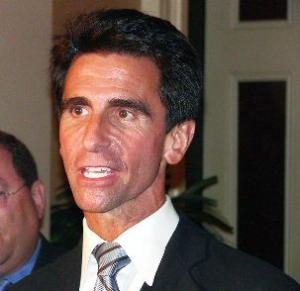Thirteen states, the District of Columbia, and the federal government have already passed laws making simple drug possession a misdemeanor instead of a felony, and the momentum appears to be growing. A bill in California to do something similar has passed the legislature and is currently sitting on the governor's desk, and efforts are afoot to push a defelonization measure through the Washington legislature next year.

In California alone, even after Gov. Jerry Brown's (D) prison realignment scheme, more than 4,000 people remain in state prisons on simple drug possession charges. At $47,000 per inmate per year, that comes out to more than a $200 million annual bill to state taxpayers.
Under current California law, people convicted of a drug possession felony can be sentenced to up to three years in prison. More than 10,000 people are charged with drug possession felonies each year, although many of them receive probation if convicted.
California state Sen. Mark Leno (D-San Francisco) moved to redress that situation with Senate Bill 649, which passed the legislature on the final day of the session. The bill is not a defelonization bill per se; instead, it makes drug possession a "wobbler," meaning it provides prosecutors with the flexibility to charge drug possession as either a felony or a misdemeanor.
"Our system is broken," said Lynne Lyman, California state director for the Drug Policy Alliance, which supported the bill. "Felony sentences don't reduce drug use and don't persuade users to seek treatment, but instead, impose tremendous barriers to housing, education and employment after release -- three things we know help keep people out of our criminal justice system and successfully reintegrating into their families and communities."
Even Republicans got on board with the bill, helping to get it through the Assembly earlier this year.

The bill currently awaits Gov. Brown's signature, and although his signature is not required for it to become law, Leno said he believed the governor would act on it, and he urged supporters to let the governor know now that they want him to sign it.
"Anyone can go to the governor's web site and offer support through an email communication," Leno said. "I am always hopeful he will sign it."
While Californians wait for the governor to act (or not), activists and legislators in Washington are gearing up to place a defelonization bill before the legislature there next year. Sensible Washington, the activist group behind the effort, says it has lined up legislative sponsors for the bill and will pre-file in December for next year's legislative session.
State Rep. Sherry Appleton (D-Poulsbo) will be the primary sponsor of this proposal in the House. Reps. Joe Fitzgibbon (D-Burien), Jim Moeller (D-Vancouver), Jessyn Farrell (D-Seattle), and Chris Reykdal (D-Tumwater) have all signed on as official cosponsors, with more to be announced soon. Sensible Washington hopes to have a companion bill filed simultaneously in the Senate.
Under current Washington law, the possession of any controlled substance (or over 40 grams of cannabis) is an automatic felony. Under this new proposal, the possession of a controlled substance -- when not intended for distribution -- would be reduced from a felony charge, to a misdemeanor (carrying a maximum sentence of 90 days, rather than five years). Laws regarding minors would not be affected.
"Removing felony charges for simple drug possession is a smart, pragmatic approach to reducing some of the harms associated with the war on drugs," said Anthony Martinelli, Sensible Washington's communications director. "The goal is to stop labeling people as felons, filling up our prisons and ruining their lives in the process, for possessing a small amount of an illegal substance."
He elaborated in a Tuesday interview with the Chronicle.
"We support full decriminalization, like the Portuguese model, but defelonization is a big step forward, and we feel that the public and lawmakers are ready for it," he said. "We have to find a way to deal with the dangers of the war on drugs. Another reason is the massive disparity in our cannabis law -- an ounce is legal, but an ounce and a half is a felony. This would remove felonies for cannabis possession, but we don't think anyone should be hit over the head with a felony for personal drug possession."
Martinelli said Sensible Washington and its allies would be spending the next few months preparing to push the bill through the legislature.
"We will be building public and legislative support, continuing to work on garnering media attention, activating our base, and getting more lawmakers on board," he said. "We're really trying to form a bipartisan coalition and get other organizations involved as well."
One of those groups is the ACLU of Washington. Sensible Washington and the ACLU of Washington were bitter foes in the fight over the state's successful I-502 marijuana legalization initiative -- Sensible Washington opposed it as a half-measure that endangered medical marijuana, a claim that ACLU and other advocates contested -- but appear to be on the same page when it comes to this sentencing reform.
"We support the decriminalization of drug use", said Alison Holcomb, criminal justice project director for the ACLU of Washington. "We're looking forward to working in collaboration with Sensible and its allies to achieve that goal."
Martinelli said he could now announce that the proposed bill has picked up its first Senate sponsor, Sen. Jeanne Kohl-Welles (D), to add to its growing list of House sponsors. Missing from that list of House sponsors is one of the most prominent drug reformers in the House, Rep. Roger Goodman (D-Kirkland), the chairman of the House Public Safety Committee, but that's not because he opposes the idea, Goodman told the Chronicle Tuesday.
"As chair of the committee, it's important for me to be an honest broker to get legislation through," Goodman explained. "My position as chair is weakened if there is a potentially controversial issue and I'm seen as being on one side of it. It's not that I oppose it, and I certainly will hold a hearing on it and move it, but my role is more to facilitate negotiations on provisions of the bill without being an interested party," he said.
It is an idea that is certainly worth pursuing, he said.
"We need to reprioritize. The tough penalties we impose on people for merely possessing drugs is so arbitrary compared to the penalties for other offenses where there is direct physical harm perpetrated against others," Goodman said. "And by now, we all acknowledge that drug possession is not merely an indiscretion, but might be linked to behavioral health issues. Our approach should be to facilitate therapeutic interventions. We have deferred prosecution programs already, but only for alcohol. Those arrested for drug possession are not eligible because it's a felony. If we could make deferred prosecution available for drug cases, we could make much more headway on the problem," he said.
And doing so would only codify what is already often existing practices, he said.
"Many or most courts and prosecutors are already pleading down felony drug cases to misdemeanors because of budget constraints and space limitations in the jails," Goodman noted. "We can change the law to conform with that practice without an additional threat to public safety. Beyond that, we could remove the prejudicial effect of a felony conviction when it is so evident they hinder people from reintegrating into the community."
While Sensible Washington and its allies are moving full steam ahead, passing the bill could be a multi-year effort, Goodman warned.
"I anticipate prosecutors saying that if we set a certain possession threshold, drug dealers will make sure they possess no more than that amount and will play the system," he said. "We have to figure out a way to find a threshold or divide possession cases into degrees. I hear the concern, but I'm not sure what the solution is. But this is a next important phase of drug policy reform: cranking down the drug war yet one more notch and doing what's rational and fiscally responsible."
There is lots of work to be done, Goodman said.
"We'll see how this plays out in the legislature. It's probably going to need more lobbying and more background discussion among more legislators," he predicted. "So far, it's not a real prominent topic, so it might end up being a work in progress. But who knows? It might catch on fire, and we'll get a quick consensus."
This work by StoptheDrugWar.org is licensed under Creative Commons Attribution-ShareAlike 4.0 International
Comments
I never thought I would see the day
I've been involved in drug policy reform for over 25 years when I was inadvertently educated (I had picked up and read a book from the local library) on the dangers and the futility of prohibition. I'm almost 62 now and thought I would never see the day when common sense would begin to prevail.
Thank you ACLU and Sensible Washington, Sherry Appleton and every one else who have taken the lead on this issue.
Add new comment